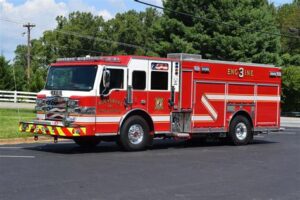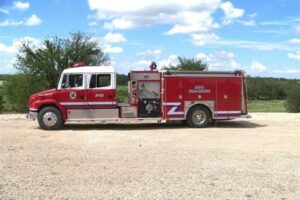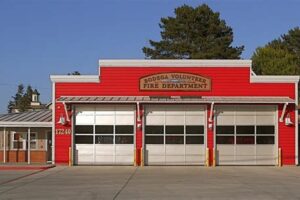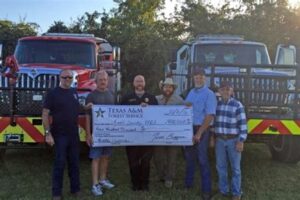Table of Contents
Discover how volunteer fire departments operate and provide vital services to communities. Learn about the recruitment process, training, and the roles and responsibilities of volunteers. Explore the challenges they face and the impact they make in ensuring public safety. Gain insight into the coordination with other emergency services and the support they receive from the community.
Have you ever wondered how volunteer fire departments manage to keep our communities safe without a paycheck? It’s a question that often sparks curiosity, especially considering the crucial role these selfless individuals play in protecting lives and property. From their swift response to emergencies to their commitment to ongoing training, volunteer fire departments operate with utmost dedication and professionalism. So, let’s dive into the inner workings of these remarkable organizations and explore how they effectively function on the frontlines of firefighting.
Introduction: The Lifeline of Communities
In communities across the country, volunteer fire departments play a crucial role in ensuring public safety. These dedicated men and women selflessly serve their neighbors, often risking their lives to protect lives and property. But have you ever wondered how these volunteer fire departments operate? In this article, we will explore the inner workings of these essential organizations and shed light on the remarkable efforts of these unsung heroes.
Recruitment and Training: The Backbone of the Department
Volunteer fire departments rely heavily on recruitment efforts to maintain an active roster of firefighters. Potential volunteers often come from within the community and go through a rigorous training process to ensure they are prepared for emergency situations. Many departments offer training academies where recruits learn essential skills such as fire suppression techniques, first aid, and search and rescue operations. This training is vital in equipping volunteers with the knowledge and skills necessary to respond effectively to emergencies.
Equipment and Funding: Balancing Limited Resources
One of the major challenges faced by volunteer fire departments is acquiring and maintaining the necessary equipment. Fire trucks, protective gear, and other firefighting tools come at a significant cost. These departments often rely on a combination of fundraising efforts and grants to secure funding for equipment purchases. Community support is crucial in ensuring that these departments have the resources they need to effectively respond to emergencies.
Emergency Response: Answering the Call
When an emergency call comes in, the volunteer firefighters spring into action. They drop whatever they are doing and rush to the fire station. Unlike their full-time counterparts, volunteer firefighters often have regular jobs and may be scattered throughout the community. To ensure quick response times, many departments utilize pagers or smartphone apps that alert volunteers of an emergency in real-time. Once on the scene, these brave men and women work tirelessly to extinguish fires, provide medical assistance, and mitigate any potential dangers.
Community Outreach: Educating and Engaging
Volunteer fire departments understand the importance of fostering a strong relationship with the community they serve. They engage in various outreach programs, such as hosting open houses, offering fire safety education in schools, and participating in community events. By actively involving themselves in the community, these departments not only raise awareness about fire safety but also build trust and camaraderie with the residents.
Mutual Aid: Collaboration for Greater Impact
Given the limited resources of volunteer fire departments, mutual aid agreements play a significant role in ensuring efficient emergency response. These agreements allow neighboring fire departments to provide assistance when a large-scale incident overwhelms the capabilities of a single department. Through mutual aid, multiple departments can combine their resources and expertise to tackle emergencies effectively.
Challenges and Sacrifices: The Reality of Volunteerism
Volunteering as a firefighter comes with its fair share of challenges and sacrifices. These brave individuals often face dangerous situations, witness traumatic events, and sacrifice their personal time and safety for the well-being of others. Balancing their commitment to the fire department with family, work, and other obligations can be demanding. However, despite the challenges, the dedication and passion of these volunteers remain unwavering.
Maintaining Readiness: Regular Drills and Training
To ensure they are always prepared for emergencies, volunteer fire departments conduct regular drills and training exercises. These sessions simulate various scenarios and help volunteers practice their skills, improve teamwork, and familiarize themselves with new equipment. By continuously honing their abilities, these firefighters maintain a high level of readiness to effectively respond to any situation that may arise.
Recognition and Appreciation: Celebrating Volunteer Firefighters
It is essential to recognize and appreciate the invaluable contributions of volunteer firefighters. These individuals selflessly serve their communities, often without receiving any monetary compensation. Public acknowledgment, gratitude, and support go a long way in boosting their morale and encouraging others to join their ranks. Whether it’s through local ceremonies, awards, or simply expressing gratitude, recognizing these everyday heroes is crucial.
Inspiring Others: The Legacy of Volunteer Fire Departments
Volunteer fire departments have a rich history and a legacy that inspires others to become involved in their communities. They embody the spirit of selflessness, bravery, and dedication to public service. As we witness their efforts and hear their stories, we are reminded of the power of unity and the incredible impact individuals can have when they come together for a common cause.
Conclusion: Unsung Heroes in Every Community
Volunteer fire departments are the unsung heroes who work tirelessly to keep our communities safe. They face numerous challenges and sacrifices but continue to embody the true meaning of community spirit. It is important for us all to appreciate their efforts, support them in any way possible, and consider lending a hand to these remarkable individuals who dedicate their lives to protecting others.
The Role and Importance of Volunteer Fire Departments in Communities
Volunteer fire departments play a critical role in ensuring the safety and well-being of communities across the nation. Comprised of dedicated individuals who selflessly give their time and effort, these departments provide essential firefighting and emergency response services without receiving any compensation. Despite their non-professional status, the commitment and dedication of volunteer firefighters are undeniable. Their willingness to put themselves in harm’s way to protect lives and property is a testament to their unwavering commitment to their communities.
The Recruitment Process of Volunteer Firefighters
To maintain an effective and well-prepared volunteer fire department, recruitment is a crucial aspect. Potential recruits must undergo a rigorous selection procedure, including interviews, physical fitness tests, and background checks. Adhering to these rigorous standards helps ensure that the department welcomes individuals who possess the necessary physical ability, mental preparedness, and commitment required to carry out firefighting and emergency response duties. This thorough recruitment process ensures that only the most qualified individuals are entrusted with the responsibility of protecting the community.
The Extensive Training Provided to Volunteer Firefighters
Once recruited, volunteer firefighters receive comprehensive training that equips them with the skills necessary to tackle various emergencies. From mastering firefighting techniques to understanding hazardous materials management, volunteer firefighters must undergo rigorous training programs developed by professional fire academies. These programs cover a wide range of topics, including fire suppression, search and rescue techniques, medical response, and incident command systems. By providing this high-quality training, volunteer fire departments ensure their members possess the knowledge and skills needed to handle diverse emergency scenarios.
The Equipment and Apparatus Utilized by Volunteer Fire Departments
Volunteer fire departments rely on a wide array of equipment and apparatus to effectively respond to emergencies. This includes engines, ladder trucks, hoses, medical equipment, and more. Obtaining and maintaining this equipment involves substantial financial investments, often relying on community fundraising efforts and grants from government entities. Despite budget constraints, volunteer fire departments work diligently to ensure their apparatus remains in optimal condition for prompt response. Regular maintenance and upgrades are essential to guarantee that the equipment is reliable and ready to be deployed at a moment’s notice.
The Systematic Call Dispatch and Communication Protocols
When an emergency call is received, volunteer fire departments follow well-established dispatch protocols to ensure swift response times. These protocols dictate the process of relaying information to the appropriate units, coordinating responses between multiple departments if necessary, and communicating updates to emergency personnel on the ground. Effective communication among multiple entities, including volunteers, other emergency services, and dispatch centers, is essential for successfully managing crisis situations. Timely and accurate information flow allows for efficient coordination and ensures that the appropriate resources are mobilized to handle emergencies effectively.
Financial Support and Challenges Faced by Volunteer Fire Departments
While volunteer firefighters provide their services free of charge, funding is still necessary to support operational costs. Volunteer fire departments secure financial support through various means, including local tax revenue, community fundraising events, and grants. Additionally, volunteer fire departments face ongoing challenges in managing limited budgets, procuring equipment, and recruiting new members, creating a constant need for creative financial solutions. The reliance on community support and creative funding strategies is crucial to ensure the sustainability and effectiveness of these critical emergency response organizations.
Mutual Aid Agreements and Collaborations
Recognizing the need for cooperation in emergency situations, volunteer fire departments often establish mutual aid agreements with neighboring departments. These agreements outline protocols for sharing resources, personnel, and expertise during large-scale emergencies or when additional assistance is required. By fostering collaboration between departments, these agreements ensure prompt and effective responses, enhancing the overall capacity to protect lives and property in the community. Mutual aid agreements are a testament to the spirit of teamwork and solidarity among volunteer fire departments, showcasing their commitment to serving and protecting their communities.
The Community Involvement and Support for Volunteer Firefighters
Volunteer fire departments heavily rely on community involvement and support to fulfill their mission. Beyond financing, community members often participate through auxiliary groups, volunteering to assist with administrative tasks, fundraising events, and community outreach initiatives. Recognizing the bravery and commitment of volunteer firefighters, communities continually express their gratitude and admiration, instilling a sense of pride among those who selflessly serve their neighbors in times of need. The strong bond between volunteer fire departments and their communities is a testament to the invaluable role these departments play in ensuring the safety and well-being of the entire community.
How Do Volunteer Fire Departments Work: A Closer Look
As a crucial part of local communities, volunteer fire departments play a vital role in ensuring public safety. These dedicated individuals selflessly dedicate their time and effort to protect lives and property in times of emergency. In this article, we will delve into the inner workings of volunteer fire departments, shedding light on their organizational structure, funding, training, and day-to-day operations.
1. Organizational Structure:
- Volunteer fire departments are typically run by a board of directors or a governing body responsible for strategic decision-making and overseeing operations.
- A chief, appointed or elected, leads the department and is responsible for managing personnel, equipment, and coordinating emergency response efforts.
- Volunteers may hold various ranks such as captains, lieutenants, and firefighters, depending on their experience and level of responsibility.
2. Funding:
- Unlike their paid counterparts, volunteer fire departments rely heavily on community support and fundraising efforts to finance their operations.
- They often organize events like pancake breakfasts, car washes, and raffles to generate funds for purchasing and maintaining equipment, training programs, and facility maintenance.
- In some cases, these departments receive partial funding from local government sources or through grants.
3. Training:
- Volunteer firefighters undergo rigorous training programs designed to equip them with the necessary skills and knowledge to handle emergency situations.
- Training includes firefighting techniques, search and rescue operations, first aid, hazardous materials handling, and proper use of firefighting equipment.
- Many departments also offer ongoing training opportunities to ensure that volunteers stay up to date with the latest advancements in firefighting techniques and equipment.
4. Day-to-Day Operations:
- Volunteer firefighters are often on-call, ready to respond to emergencies at any time of the day or night.
- When an emergency call is received, a designated dispatcher alerts the volunteers through pagers, phones, or other communication methods.
- Upon arrival at the fire station, the volunteers quickly don their protective gear, board the fire trucks, and rush to the scene of the incident.
- During non-emergency periods, volunteers engage in routine maintenance tasks, equipment checks, and community outreach programs.
Overall, volunteer fire departments function through the unwavering dedication and commitment of selfless individuals who put their lives on the line for the safety of others. Their ability to operate effectively despite limited resources is a testament to their passion for serving their communities. So, next time you see a volunteer firefighter, remember to thank them for their invaluable service.
Thank you for joining us today as we explored the inner workings of volunteer fire departments. We hope this article has shed some light on the incredible dedication and commitment of these selfless individuals who serve their communities day in and day out. From responding to emergencies to maintaining equipment and conducting training exercises, volunteer firefighters play a critical role in keeping our neighborhoods safe.
First and foremost, let’s address the question of how volunteer fire departments function without a dedicated budget or paid staff. These organizations heavily rely on the generosity and support of their communities. While they may receive some funding from local governments or through grants, the majority of their financial resources come from fundraising efforts and donations. From car washes to pancake breakfasts and community events, volunteers work tirelessly to raise the necessary funds to cover operational expenses, such as purchasing and maintaining firefighting equipment and ensuring the availability of training programs.
So, how do these departments recruit and train their volunteers? Well, recruiting new members can be a challenging task for volunteer fire departments. They often rely on word-of-mouth recommendations or advertise their need for volunteers through local newspapers, social media platforms, or community bulletin boards. Once individuals express interest, they typically undergo an application and interview process, followed by extensive training.
Transitioning to the training aspect, volunteer firefighters receive comprehensive education and practical skills training to ensure they are well-prepared for the challenges they may face in the field. This training covers various areas, including fire suppression techniques, first aid and CPR, hazardous materials response, and search and rescue operations. Volunteers must commit to attending regular training sessions and drills to maintain their skills and stay up-to-date with the latest firefighting techniques and safety protocols. This continuous learning and improvement are crucial to ensure the highest level of service to the community.
In conclusion, volunteer fire departments operate through the unwavering dedication of their members and the support of their communities. Through fundraising efforts and donations, they secure the necessary resources to function effectively. The recruitment and training processes are carefully designed to ensure that volunteers are equipped with the knowledge and skills needed to respond to emergencies. We salute the brave men and women who volunteer their time and risk their lives to protect us all.
Video How Do Volunteer Fire Departments Work
As a journalist, I understand the importance of providing clear and concise information to address common questions. So here are the most frequently asked questions about how volunteer fire departments work:
1. How do volunteer fire departments operate?
Volunteer fire departments are organizations made up of individuals who dedicate their time and skills to provide firefighting and emergency services within their community. These departments rely on volunteers who undergo training to become certified firefighters.
2. How are volunteer firefighters trained?
Volunteer firefighters receive comprehensive training that covers various aspects of firefighting and emergency response. This training includes learning about fire behavior, using firefighting equipment, performing search and rescue operations, administering first aid, and understanding hazardous materials handling.
3. Do volunteer firefighters get paid?
No, volunteer firefighters do not receive a regular salary for their services. They willingly offer their time and expertise without compensation. However, some departments may provide certain benefits such as insurance coverage or retirement plans.
4. How do volunteer fire departments obtain funding?
Volunteer fire departments rely on a combination of funding sources to support their operations. These sources may include local government contributions, grants, donations from individuals and businesses, fundraising events, and sometimes even membership fees.
5. What types of emergencies do volunteer fire departments respond to?
Volunteer fire departments respond to a wide range of emergencies, including structural fires, vehicle accidents, medical emergencies, natural disasters, and hazardous materials incidents. Their primary goal is to protect lives and property within their jurisdiction.
6. How can someone become a volunteer firefighter?
To become a volunteer firefighter, interested individuals typically need to meet certain requirements, such as being of a minimum age, possessing a valid driver’s license, and passing a background check. They then undergo training provided by the fire department or through accredited programs.
7. What are the benefits of volunteering for a fire department?
Volunteering for a fire department can be a rewarding experience both personally and professionally. It allows individuals to serve their community, develop valuable skills in firefighting and emergency response, work as part of a team, and make a meaningful difference during times of crisis.
8. Are volunteer fire departments as effective as career fire departments?
While volunteer fire departments may face some challenges due to their reliance on part-time volunteers, they can be just as effective as career fire departments in many cases. The commitment and dedication of volunteer firefighters, coupled with proper training and equipment, allow them to respond to emergencies efficiently and protect their communities.
9. Can volunteer firefighters become career firefighters?
Absolutely! Many career firefighters started their journey as volunteers. Volunteering provides an excellent opportunity for individuals to gain experience and knowledge in firefighting, which can lead to pursuing a career in the field. Additionally, volunteer firefighters often receive preference when applying for paid firefighting positions.
By addressing these commonly asked questions, I hope to have shed light on the workings of volunteer fire departments and the vital role they play in keeping our communities safe.






